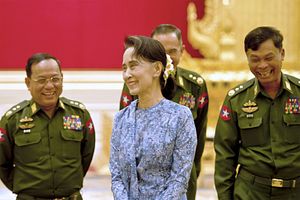The National League for Democracy (NLD) government’s first year in power has not been easy. While there have been some important achievements, Aung San Suu Kyi and her party have struggled with economic policy, the peace process, and political violence. The NLD lacks governance experience, and the executive branch does not have control over the armed forces. As a result, the government has often appeared ineffectual. Still, much of the population is grateful to have leaders of their own choosing in office, and they are prepared to give the ruling party time.
A year ago, despite her party’s landslide election victory, it was not clear what position Aung San Suu Kyi would take in the government. She could not assume the presidency due to a constitutional clause barring those who have foreign spouses or children. After it became clear that the military was not going to make an exception for her (indeed the clause may have been written specifically to block her), the NLD came up with an ingenious solution. They created a new position, state counselor, approved by the NLD-dominated parliament, which has given her authority akin to a prime minister. She is also the foreign affairs minister and minister of the president’s office. With her loyal friend, Htin Kyaw, serving as the president, Suu Kyi has acted as the de facto head of government.
Finding qualified people to serve in senior positions in the government was another challenge. Few outside of the former regime had policymaking experience. Many long-time NLD members were eager to take posts but had never worked in government. Suu Kyi wanted a clean government, and a unified, loyal government. For the cabinet, she ultimately chose a few NLD members and several former civil servants whom she believed would act in accordance with her vision. She reduced the total number of ministries from 35 to 18. This cost-cutting measure also facilitated closer oversight of the government. Decision-making has remained highly centralized.
































